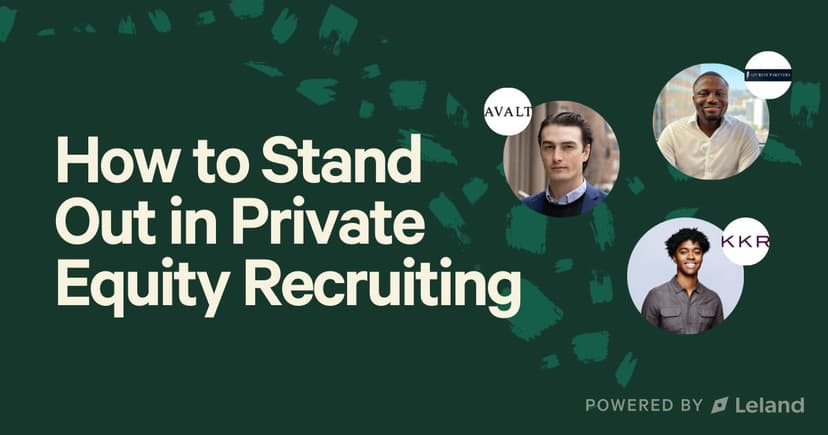How to Get Into Private Equity: The Ultimate Guide
Learn exactly how to break into private equity from investment banking, consulting, undergrad, or a non-traditional path with expert strategies, recruiting tips, and real examples.
Posted August 18, 2025

Join a free event
Learn from top coaches and industry experts in live, interactive sessions you can join for free.
Table of Contents
Breaking into private equity is highly competitive, but the payoff, both financially and professionally, is unmatched in finance. Whether you're coming from investment banking, consulting, or a PE-backed portfolio company, understanding the private equity recruitment process, what firms actually look for, and how to stand out is essential.
This guide shares what top private equity firms actually value, the career path progression, how private equity interviews work, and actionable ways to position yourself for success, even if you didn’t start in banking.
Read: Why Private Equity? Ex-PE VP on How to Answer + Expert Tips
What Is Private Equity?
Private equity (PE) involves making private equity investments in private companies, typically using outside capital from limited partners (LPs) to acquire, grow, and eventually exit businesses at a profit, often through a sale or IPO. These investments are structured and managed by general partners (GPs) who oversee the fund’s strategy, execution, and returns.
In most private equity circles, the dominant investment model is the leveraged buyout (LBO), where firms purchase companies using a mix of debt and equity to amplify returns. This high-risk, high-reward approach demands sophisticated financial modeling, rigorous due diligence, and a clear strategy for value creation across the life of the investment.
About the LPs and GPs in Private Equity
Limited Partnerships are the legal structure underpinning most PE funds, typically lasting around 10 years. Within this framework, Limited Partners (LPs), such as pension funds, endowments, insurance companies, family offices, and ultra-high-net-worth individuals, provide the capital but remain passive. Their liability is capped at the amount they commit, and they defer daily decision-making to the fund. Distributions to LPs follow a waterfall structure, often including a preferred return before carried interest flows to General Partners
On the other hand, General Partners (GPs) are the fund managers. They source deals, negotiate acquisitions, manage portfolio companies, and ultimately lead exits. GPs assume full liability for fund debt and operations and are compensated through management fees (typically around 2% of total assets) and carried interest (usually 20% of profit). Their incentives align closely with LPs: both parties profit when portfolio companies outperform.
Read: What is Private Equity and How Does It Work?
Key Types of PE Firms and Investment Strategies
| Firm Type | Investment Focus | Backgrounds That Fit |
|---|---|---|
| Buyout Firms | Mature, cash-generating businesses via LBOs | Investment banking, FP&A, LBO modeling |
| Growth Equity Firms | Scalable, late-stage companies needing capital | Strategy, corp dev, consulting, venture capital |
| Venture Capital Firms | Early-stage startups in tech, biotech, SaaS | Product, ops, startup, technical background |
| Distressed/Turnaround | Underperforming or bankrupt firms | Restructuring, legal, credit |
| Mezzanine Funds | Debt + equity hybrids for mid-market growth | Structured finance, credit modeling |
| Real Estate PE | Commercial/residential acquisitions and developments | Real estate underwriting, development, and RE modeling |
| Infrastructure Funds | Long-term assets like airports, energy, and utilities | Project finance, ESG, PPPs |
| Fund of Funds | PE fund investors managing multi-fund portfolios | Allocator roles, due diligence, macro view of investment strategies |
Private equity investments vary widely, and understanding the differences helps you match your skills and target firms that value your experience.
How to Get Into Private Equity: The 5 Most Common Paths
1. From Investment Banking (The Most Direct Route)
If you're currently an investment banking analyst at a top-tier firm—bulge bracket or elite boutique—you’re on the most traditional and well-trodden path into private equity. But don’t assume the private equity job title guarantees an offer. What really matters is the quality of your deal experience, your ability to build leveraged buyout (LBO) models from scratch, and the strength of your internal reputation. The most successful candidates seek out buy-side transactions, especially carveouts, take-privates, and LBOs, where they can demonstrate clear exposure to the investment process. It’s not enough to be on the team—you need to have real ownership of workstreams and know your numbers cold. Keep a detailed deal log that outlines key metrics, rationale, and your specific contributions. Private equity recruiters rely heavily on informal references from VPs and MDs, so strong internal reviews are critical. And in interviews, the difference-maker is the ability to walk through deals like an investor—explaining the why behind each transaction, not just the what.
Real-world insight: Analysts with two or more closed deals and clear narratives about their impact got traction with recruiters significantly faster than peers stuck on pitches or internal models.
2. From Consulting, FP&A, or Corporate Strategy
While investment banking is the most common entry point, PE firms are increasingly hiring from management consulting, FP&A, and corporate strategy, especially at growth equity and operationally focused funds. The key is repositioning your experience through the lens of value creation. That means quantifying the impact of your work on margin expansion, revenue growth, or operational improvements. Did your pricing strategy increase EBITDA? Did your GTM project reduce churn? Make that clear. Because these roles don’t typically offer LBO training, you’ll also need to close the technical skills gap by learning to build full LBOs and analyzing capital structures independently. Candidates who excel often complete online modeling courses, publish investment memos, or participate in live case competitions to build a portfolio of investor-style thinking. From there, focus your networking on alumni from PE firms, especially those who have also made the consulting-to-PE transition. Highlight your leadership on long-term projects, your ability to work cross-functionally, and your interest in the investment side of the business.
Real-world insight: One applicant described how they broke into PE from Big 4 consulting by completing a self-paced LBO program and sending original investment theses directly to firms. Several eventually led to interviews.
3. From Corporate Development or BizOps in PE-Backed Firms
If you’re working in corporate development or business operations at a private equity-backed company, you already sit inside the ecosystem, and that gives you a powerful edge. This increasingly common “operator-to-investor” path allows you to gain exposure to diligence, deal execution, and board-level reporting while actively improving a portfolio company’s performance. Because you understand the company from the inside, such as its levers, risks, and growth strategy, you often bring a level of operational insight that investment bankers lack. Many PE firms now proactively recruit from their own portfolio companies, especially for roles on portfolio support teams or investment roles at operationally focused funds. To move up, focus on expanding your responsibilities (e.g., leading M&A activity or budget forecasting) and developing a point of view on what makes a business worth acquiring. Highlight those experiences in your resume, pitch them like investment cases in interviews, and stay close to the investors you’re already working with; they’re often your best bridge into a full investing role.
4. From Undergrad or Business School
Breaking into PE straight from undergrad or business school is rare but very possible if you time it right and prepare like a professional investor. For MBAs, on-cycle recruiting starts as early as September of the first year. For undergrads, many pre-MBA associate roles are filled just weeks into senior fall. That means preparation starts well in advance. Top candidates build experience through student-run investment funds, search funds, PE internships, or by independently writing investment theses on public companies. You’ll also need to master financial modeling and show that you can think critically about deals, markets, and management teams. Most firms hire through referrals, clubs, and alumni networks. Use every available connection to learn firm-specific recruiting timelines and strategies. Finally, don’t just target the biggest brand names; many lower middle market and growth equity firms value scrappy, self-directed candidates who are genuinely interested in investing over prestige.
Read: Why an MBA is the Best Time to Start a Business
5. Through Operating Partner or Specialist Roles
As private equity evolves beyond financial engineering, operating partners and functional experts are becoming indispensable. Professionals with deep expertise in supply chain, product development, go-to-market, or organizational design are being brought into PE firms to drive operational improvements across portfolio companies. If you’re an executive with a proven track record of improving EBITDA, scaling teams, or transforming business units, this can be your path in. These roles often involve supporting diligence on new investments, executing transformation initiatives, and serving as advisors (or interim execs) within the portfolio. In recent years, many firms have also created dedicated “Value Creation Teams” or “Operating Groups” to house this private equity talent internally. From there, it’s possible to move into a broader investment role, especially at firms that want professionals who can both source deals and improve performance post-close. The bar is high, but if you bring domain depth and strong leadership, it’s one of the most respected ways into the PE world.
What Private Equity Firms Look For
Here’s what top PE firms care about beyond your resume:
| Skill | Why It Matters in PE | How to Build or Demonstrate It | What Top Firms Expect |
|---|---|---|---|
| Financial Modeling | LBOs are the core of private equity investing. You’ll use them to evaluate deals, test return scenarios, and make investment committee decisions. | Build LBOs from scratch in Excel. Use case studies under time pressure. Recreate real deals with public data. | You can build a full 3-statement LBO in under 60 minutes, justify your assumptions, and narrate tradeoffs under pressure. |
| Due Diligence | PE professionals lead deep diligence across financials, markets, legal risks, and operations to identify upside and de-risk deals. | Read CIMs, practice commercial diligence, and study past deal breakdowns. Mock diligence memos help build reps. | You can assess risks and growth levers across functions and articulate them in a clear, structured, and investor-friendly way. |
| Valuation & Investment Strategy | Every investment must fit the firm’s thesis. You must weigh risk vs. return and determine if the deal supports the fund’s long-term goals. | Master DCFs, public comps, precedent transactions. Read investment memos and write your own pitches with a rationale. | You make investment decisions based on strategy and risk/reward logic, not just spreadsheet outputs. |
| Financial Statement Analysis | You need to interpret income statements, balance sheets, and cash flow statements to spot issues and estimate future performance. | Analyze 10-Ks and 10-Qs. Trace historical data into models. Understand working capital, cash conversion, and leverage. | You can explain how cash flow timing, margins, and leverage interact to drive IRR without relying on templates. |
| Executive Presence | You'll be interfacing with founders, CEOs, and board members from day one. They expect poise, confidence, and clarity—regardless of your level. | Watch senior team calls, shadow leaders, and ask for feedback on presence. Practice speaking concisely under pressure. | You handle C-level conversations calmly, ask smart questions, and don’t overcompensate or try to sound overly technical. |
| Communication & Storytelling | Whether pitching a deal, leading a diligence call, or writing an IC memo, you need to persuade and clarify with logic and narrative. | Practice investment pitches aloud. Study sample memos. Write memos for mock or real deals and get feedback from a coach. | Your written work is clean, structured, and strategic—and your verbal explanations are confident and to the point. |
| Critical Thinking | PE isn’t just about numbers—it’s about judgment. Can you identify what matters most in a deal, and why? | Study patterns in good vs. bad deals. Use frameworks like Porter’s Five Forces, moat analysis, or margin tree breakdowns. | You can prioritize risks and value drivers quickly and explain your rationale using both data and intuition. |
| Relationship Management | From managing diligence calls to supporting founders post-close, your ability to build trust determines your effectiveness. | Build rapport with coworkers, founders, LPs. Observe how senior investors lead calls and debriefs. Practice “EQ + IQ.” | You earn trust quickly, avoid ego clashes, and make people want to work with you—internally and externally. |
Pro tip: Practice LBOs aloud while explaining assumptions like an associate would. It’s the #1 skill firms say separates hired vs. passed candidates.
Connect with a private equity coach who’s worked at top firms like KKR, Blackstone, or Bain Capital to help you prepare like a real insider.
What Private Equity Interviews Actually Look Like
Whether you're recruiting through the on-cycle process as an investment banking analyst or navigating an off-cycle path from consulting or corporate development, the private equity interview process goes far beyond testing your technical knowledge. Firms are assessing how you think, how you communicate, and whether you can operate like a future investor. Here’s how each core component typically unfolds.
Modeling Tests
Most interviews begin with a time-pressured LBO modeling test, often giving you less than 60 minutes to complete a full model from scratch. This isn't just about spreadsheet accuracy. Interviewers want to see if you can build a functioning model that reflects the economic reality of a deal: clean capital structure logic, reasonable revenue and margin assumptions, and a clear view of returns. More importantly, you'll need to defend your thinking. Why did you choose 3.5x leverage instead of 5.0x? What’s the rationale behind your 15% revenue CAGR or your chosen exit multiple? Great candidates narrate their assumptions with the same clarity they’d use in an investment committee meeting.
Deal Walkthroughs
If you’ve worked on a real transaction, whether in banking, consulting, corp dev, or a PE-backed company, you’ll almost certainly be asked to walk through it in detail. This is where firms test your ability to think like an investor, not just a participant. You’ll need to explain what the company did, why the deal happened, and what the investment thesis was. Strong candidates highlight the role they played in the deal, how their analysis influenced the process, and what the outcome was. But it’s not just about what went well. Interviewers will dig into what didn’t go to plan and how you handled challenges because sound judgment under imperfect conditions is one of the most valuable traits in private equity.
Investment Pitches
One of the most telling parts of any private equity interview is the investment pitch. You’ll typically be asked to come prepared to pitch a public company or a target you think would make a good investment. Firms are looking to see how you source ideas, how you evaluate value creation levers, and how well you understand the firm’s investment strategy. Can you explain why this company is attractive now? What would make it a strong acquisition target? How would you grow or improve it post-close, and when would you look to exit? This is where your pattern recognition, market awareness, and strategic clarity really shine or fall flat.
Fit and Behavioral Questions
Finally, private equity firms spend significant time assessing fit and it’s far more nuanced than most candidates expect. PE teams are lean, high-trust environments, and they’re investing in your long-term trajectory, not just your technical output. Interviewers are looking for coachability, intellectual curiosity, maturity, and the ability to earn trust quickly. You’ll be asked about how you work with teams, take feedback, resolve ambiguity, and manage through high-pressure situations. Many firms will also test your interest in them specifically by asking about their own portfolio companies. Expect to be asked how you'd improve one—whether that’s expanding margins, entering a new market, or reshaping the go-to-market strategy. Strong candidates demonstrate not only insight into the business but also a clear understanding of how the firm typically creates value.
Expert insight: Many firms now ask about their own portfolio companies, so be prepared to share insights on one and how you’d improve it.
Read: What to Know About Private Equity Recruiters & Headhunters
On-Cycle vs Off-Cycle Recruiting
| Category | On-Cycle Recruiting | Off-Cycle Recruiting |
|---|---|---|
| Who It Targets | Primarily 1st- and 2nd-year investment banking analysts at top-tier firms | A broader mix: consultants, corporate development, post-MBAs, international applicants, and operators |
| Timeline | Begins as early as September and moves at breakneck speed—offers can be extended within 72 hours | Happens year-round, with timelines depending on specific firm needs or openings |
| Process Structure | Highly structured and orchestrated by a few dominant headhunters (e.g., CPI, SG Partners, Henkel) | Less standardized. Can involve headhunters, direct outreach, or internal referrals |
| Speed & Pressure | Extremely fast-paced: Modeling tests, interviews, and offers are often completed within days | More variable pace, often includes multiple rounds over weeks or months |
| Flexibility | Very rigid. Focused on a narrow candidate pool, with little room for unorthodox backgrounds | More flexible. Firms are more open to candidates with non-traditional backgrounds or unique experience |
| Firm Type | Typically, large-cap buyout firms and mega funds with formal associate classes | Includes lower middle market, growth equity, and operator-focused funds |
| Best Prep Strategy | Build relationships with recruiters early, have deal experience ready, and practice LBOs extensively | Focus on networking, personalized outreach, and positioning your value creation story |
| Ideal for | Candidates with a traditional investment banking pedigree and a clear intent to exit into PE | Private equity professionals looking to pivot into investing, often with more strategic or operational backgrounds |
| Common Pitfalls | Relying too much on brand name, not being technically or behaviorally prepared for the 48-hour sprint | Being passive, waiting for private equity roles to be posted instead of proactively building relationships |
Real-world Insight: Off-cycle roles are often filled through relationships or private equity hiring needs at portfolio companies, not online private equity job boards.
Read: On-Cycle, Off-Cycle, vs. Full-Cycle Recruiting
How to Prepare for Private Equity Interviews
Private equity interviews are designed to pressure-test your technical skills, investment judgment, and fit with the firm. Top candidates prepare with precision, not just practicing questions, but thinking like investors.
1. Study the firm like an investor would
Before any interview, you should know the firm’s investment strategy, deal history, and portfolio companies in detail. Go beyond the “About” page. Read their press releases, dive into case studies, and understand how they define value. If you can’t articulate why their investment strategy resonates with you or where you’d focus your sourcing, you’re not ready.
Read: Private Equity Case Study Guide: Example & Practice
2. Build and explain LBOS under pressure
Expect to complete an LBO model in 30–60 minutes, either in Excel or via a take-home test. But technical accuracy alone isn’t enough. You need to explain your assumptions clearly: why a 10% revenue CAGR? Why 2.5x leverage? Show that you understand how debt, equity, cash flow, and exit timing drive IRR.
3. Nail the core private equity interview questions
Every candidate gets some version of: “Why private equity?”, “Walk me through a deal,” and “How would you improve one of our portfolio companies?” Practice these until your answers are tight, specific, and grounded in logic. Use real frameworks. In deal walkthroughs, focus on your contribution, key metrics, and the investment rationale, not just the transaction mechanics.
Read: The 50 Most Common Private Equity Interview Questions
4. Tie your experience to the investment process
Whether you're coming from banking, consulting, or elsewhere, connect your past work to what private equity firms care about: sourcing deals, assessing risk, driving EBITDA growth, and planning exits. Avoid generic buzzwords. Explain how your work prepared you to think like an investor.
5. Prove you’re a good fit beyond the resumé
Firms are hiring future leaders, not spreadsheet machines. Show that you're intellectually curious, able to build trust with management, and willing to put in the reps to grow. Be coachable. Bring humility, but also conviction. A candidate who can think independently and take feedback well stands out in any room.
The Private Equity Career Path
| Role | Core Responsibilities | What Success Looks Like |
|---|---|---|
| Analyst | Build financial models, conduct market research, support due diligence, and prepare materials for internal and external review. | Precision in modeling, intellectual curiosity, and the ability to learn quickly under pressure. |
| Associate | Take ownership of key deal workstreams, manage advisors, lead data rooms, and draft investment committee memos with minimal handholding. | Thinks like an investor—not just an analyst. Shows initiative, judgment, and the ability to synthesize complex data. |
| Senior Associate | Lead diligence processes, mentor junior team members, and support ongoing portfolio management across multiple investments. | Exhibits leadership, commercial instinct, and emerging sourcing capabilities. Trusted to represent the firm externally. |
| Vice President | Drive deal sourcing, manage relationships with bankers and advisors, run IC processes, and oversee associates and analysts. | Operates independently, frames investment theses, and contributes meaningfully to firm strategy and team development. |
| Principal | Lead deal execution and negotiation, manage limited partner relationships, and support capital raising and new fund initiatives. | Combines sharp commercial judgment with the ability to navigate high-stakes negotiations and drive internal alignment. |
| Partner / Managing Director | Set investment strategy, lead firm-wide initiatives, sit on portfolio company boards, raise capital, and guide junior talent. | Delivers consistent returns, mentors future leaders, expands the firm’s network, and embodies long-term market leadership. |
Note: Some firms skip the Analyst title and start at Associate for pre-MBA hires. At others, Principal may be a step between VP and Partner, with distinct fundraising and origination responsibilities.
Read: Private Equity Roles: The Different Career Paths
Final Tips on How to Get Into Private Equity
Start Thinking Like an Investor Now
The best candidates don’t wait for interviews to start thinking like investors; they already behave like one. Build full LBOs from scratch, write investment memos on public companies, and develop your own theses around where value can be created through pricing strategy, company operations, or capital structure optimization. Track recent private equity investments and articulate what made the deal attractive. If you want to stand out in interviews, bring independent insights, not recycled talking points. Firms are looking for people who have done the work over an extended period, not just those who cram before recruiting.
Build Deep, Long-Term Relationships
Your relationships will often matter more than your resume. Most firms don't hire candidates through job boards—they recruit through trust networks. That means you need to start early, connect with private equity recruiters, and build rapport with your own analysts and associates already inside firms. These individuals are often the gatekeepers for resume pushes or informal references. Cold emails rarely convert. Instead, ask smart questions, show genuine curiosity, and offer insight, not just interest. The most effective networking happens when you treat it like facilitating deals: research, warm intros, follow-up, and long-term thinking.
Prioritize Training, Not Just Fund Size
It's easy to be drawn to prestige or mega funds, but early in your career, nothing matters more than the quality of your learning environment. A lean team at a $500M middle-market fund will likely give you more reps in sourcing, diligence, and portfolio management than a siloed role at a multi-billion dollar platform. Ask about the firm’s company culture: Do associates get face time with partners? Do they attend IC meetings? Are they involved post-close in improving portfolio companies? Optimize for mentorship, ownership, and access to deals, not just brand recognition.
Preparation Is What Builds Confidence
True confidence in interviews doesn’t come from faking it; it comes from reps. The candidates who consistently break in aren’t just “smart.” They’ve drilled financial modeling, practiced private equity interviews, walked through deals aloud, and studied how firms actually create value. They understand the evolving demands of the role: it’s about managing risk, improving outcomes, and communicating clearly with CEOs and LPs. They also know how to compare different finance roles (e.g., PE vs. hedge funds) and explain why private equity fits their strengths and interests best. Whether you come from investment banking, consulting, or a less traditional path, the best preparation makes you feel like you already belong in the seat.
Break Into PE With the Help of an Expert
The best advice? Talk to real professionals. Reach out to alumni, attend industry events, and follow investor podcasts. Many insiders will share their path and pitfalls if you ask.
Want to accelerate your journey? Work 1:1 with a private equity coach to get personalized feedback, resume help, and interview prep. Browse vetted PE coaches here. Also, check out private equity and investment banking bootcamps as well as free events and group classes for more effective strategies!
See: The 10 Best Private Equity Career Coaches for Interview Prep & Training
Read next:
- The Best Venture Capital & Private Equity Newsletters and Podcasts
- An Expert’s Guide to Resumes: Five Tips to Make You Stand Out
- Buy-Side vs. Sell-Side: Different Types of Firms & How to Choose One
- Finance Internships for College & High School Students (2025-2026)
- Private Equity Secondaries: Interview Guide & Questions
- What to Ask Your Private Equity Interviewer
- Top Skills You Need to Break Into Private Equity
FAQs
What is the best way to get into private equity?
- Investment Banking - This is by far the most common way to get into top-tier private equity firms. These firms recruit top analysts out of investment banking analyst programs. Analysts interview for PE shops early in their first year and then work at their banks for 2 years before moving over.
What qualifications do I need to get into private equity?
- To become a private equity analyst, you will need a bachelor's degree in accounting, finance, or a related programme and sometimes an MBA as well. Entry-level positions are available, but usually, experience working in the financial sector is a requirement.
What is the 80/20 rule in private equity?
- The typical split in profits between LPs and GP is 80 / 20. That means the LP gets distributed 80% of the profits on an exit (after returning their initial capital), and the GP keeps 20% of the profits.
Is private equity high-paying?
- Pays High Wages – The average worker at private equity-backed businesses earned $85,000 in wages and benefits in 2024, a 6 percent increase from 2022. Fuels Economic Growth – Private equity investments generated $2 trillion of gross domestic product (GDP), an increase from $1.7 trillion in 2020.
What is a full catch-up in private equity?
- 100% Catch-Up: The GP receives 100% of the profits during the catch-up phase until they are entitled to the full carried interest (as described in the example). 2. Partial Catch-Up: In some funds, GPs may only receive a portion of the profits (e.g., 50%) during the catch-up phase, rather than the full 100%
Browse hundreds of expert coaches
Leland coaches have helped thousands of people achieve their goals. A dedicated mentor can make all the difference.



















